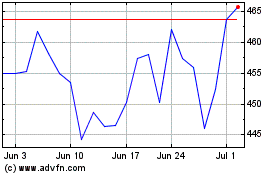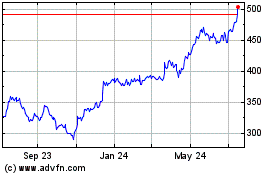By Liz Hoffman and Peter Rudegeair
When Spotify Technology SA went public in April, Goldman Sachs
Group Inc. was sitting on a stake in the music-streaming startup
worth more than $350 million, a sevenfold return on a 2012
investment.
Those gains weren't the handiwork of any of the hundreds of
Goldman professionals whose day jobs are to invest in companies.
They came instead from the firm's bankers, who have been quietly
moonlighting as venture capitalists.
These corporate consiglieres, who advise on mergers and
underwrite securities, oversee a venture-capital portfolio worth
several hundred million dollars, according to people familiar with
the matter.
Plenty of big banks invest in promising startups, but they
typically do so through their strategy groups or asset-management
arms. Goldman has those, too, but they are distinct from the
portfolio maintained by its investment bankers, who are investing
on the bank's behalf.
The bankers were early backers of now-household names including
Uber Technologies Inc., online storage vault Dropbox Inc. and
payments company Square Inc. Recent investments, according to the
people, include Ripple Foods Inc., which makes milk from peas, and
Beyond Meat, which makes, as its name implies, meatless
burgers.
As startup valuations have soared, seemingly everyone wants to
be a venture capitalist. Celebrities including Kobe Bryant and
Jared Leto have invested in private companies. A member of the
Dutch royal family cashed in a stake in payments firm Adyen NV when
it went public last week.
Goldman's investment bankers are hoping to cement their ties to
emerging companies that might later hire the bank for an IPO or
sale. (The bank calls it "relationship equity.")
"We are proud to provide creative solutions, excellent execution
and in certain unique situations, small, passive capital
investments to further our client's goals," Dan Dees, Goldman's top
technology banker, said in a statement.
The upside -- if it can pick winners and avoid duds -- is
profits that can far outstrip the fees Goldman might get from those
deals. Goldman made about $15 million advising Spotify on its IPO,
people familiar with the matter said, versus hundreds of millions
of dollars in paper gains on its shares.
The strategy is a throwback to the old merchant-banking
playbook, when banks regularly put capital to work alongside
clients. That model has largely fallen out of favor with large
banks -- a retreat hastened by the crisis and new regulations that
followed -- but is still practiced by a handful of smaller boutique
banks, including Byron Trott's BDT Capital Partners LLC and Skip
McGee's Intrepid Financial Partners LLC.
Goldman's dual roles could pose conflicts as its bankers advise
startups on deals that could result in big profits or losses on the
stakes owned by the investment bank. What's more, Goldman has
raised billions of dollars from outside investors for its
private-equity funds and risks being accused of cherry-picking the
best deals for itself.
Sarah Friar, Square's chief financial officer and a former
Goldman research analyst, said the bank's investment in Square
"showed they wanted to build a relationship more long-term in
nature."
As for the potential conflicts, she said Square does much of its
deal work internally, without hiring bankers, and is "not short of
advice" from other sources.
Still, venture investing is risky, especially now as the
exuberance that propelled valuations sky-high shows signs of
cooling.
Viddy Inc., a startup touted as "the Instagram for video,"
raised money from Goldman in 2012 but shut down its smartphone app
two years later. Investments in ZocDoc Inc., an online appointment
and ratings system for doctors, and e-commerce firm Beachmint Inc.
haven't performed as expected, people familiar with the matter
said.
And Goldman has been burned before. In 1999, the firm invested
$100 million in online grocer Webvan Group Inc., a deal endorsed by
Hank Paulson, who had been a senior investment banker and later
became Goldman's chief executive, people familiar with the matter
said. Webvan went bankrupt two years later as the dot-com bubble
burst.
The recent effort traces back to the lean years after the
financial crisis, when IPOs dried up. Eager to stay close to
promising startups, Goldman focused on introducing them to venture
capitalists. As its bankers brokered fundraising rounds, they began
putting the firm's money in, too.
They invested $25 million in Dropbox in 2011 and $5 million in
Square in 2012, according to securities filings and people familiar
with the matter. Goldman later made loans to both companies and was
lead underwriter on their IPOs.
When Square went public in 2015, its lower-than-expected IPO
price triggered a provision in Square's shareholder agreements that
required the company to give its investors, including Goldman,
additional shares. Goldman was among the banks that helped set the
IPO price.
Goldman invested in Uber at a roughly $200 million valuation in
2011, the people said. The deal -- a huge winner, as Uber's
valuation has soared past $50 billion -- benefited from a stroke of
luck: When Goldman executives sought approval from then-CFO David
Viniar, he had recently received a call from his daughter in San
Francisco about a hot new app that summoned cars on demand.
Goldman's bankers have been branching out in their investing.
What was once known internally as the Internet Fund is now the
Growth Investment Fund, and executives have been tasked with
sourcing investment opportunities in consumer products, financial
services, energy and health care. Recent investments include Beyond
Meats and Ripple, as well as credit-card startup Marqeta Inc., said
people familiar with the matter.
(END) Dow Jones Newswires
June 17, 2018 07:14 ET (11:14 GMT)
Copyright (c) 2018 Dow Jones & Company, Inc.
Goldman Sachs (NYSE:GS)
Historical Stock Chart
From Mar 2024 to Apr 2024

Goldman Sachs (NYSE:GS)
Historical Stock Chart
From Apr 2023 to Apr 2024
